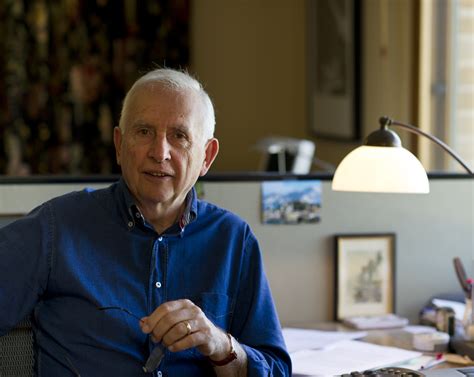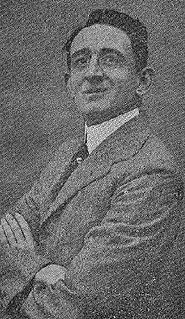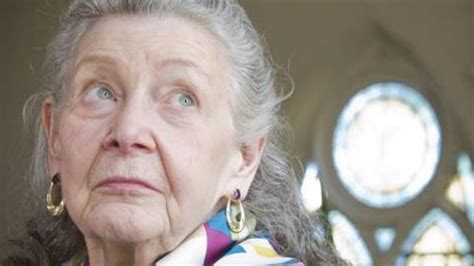A Quote by Michael Horton
The gospel is unintelligible to most people today, especially in the West, because their own particular stories are remote from the story of creation, fall, redemption, and consummation that is narrated in the Bible. Our focus is introspective and narrow, confided to our own immediate knowledge, experience, and intuition. Trying desperately to get others, including God, to make us happy, we cannot seem to catch a glimpse of the real story that gives us a meaningful role.
Quote Topics
Because
Bible
Cannot
Catch
Creation
Desperately
Experience
Fall
Focus
Get
Gives
Glimpse
God
Gospel
Happy
Immediate
Including
Introspective
Intuition
Knowledge
Make
Meaningful
Most
Narrow
Others
Our
Own
Particular
People
Real
Real Story
Redemption
Remote
Role
Seem
Stories
Story
Today
Trying
Unintelligible
Us
We Cannot
West
Related Quotes
We have to face the unpleasant as well as the affirmative side of the human story, including our own story as a nation, our own stories of our peoples. We have got to have the ugly facts in order to protect us from the official view of reality. Otherwise, we are squeezed empty and filled with what other people want us to think and feel and experience.
Worldviews have four elements that help us understand how a person's story fits together: creation, fall, redemption, and restoration. "Creation" tells us how things began, where everything came from (including us), the reason for our origins, and what ultimate reality is like. "Fall" describes the problem (since we all know something has gone wrong with the world). "Redemption" gives us the solution, the way to fix what went wrong. "Restoration" describes what the world would look like once the repair begins to take place.
Each of us is our own story, but none of us is only our own story. The arc of my own personal story is inexplicably and intrinsically linked to the story of my parents and the story of my neighbor and the story of the kid that I met one time. All of us are linked in ways that we don't always see. We are never simply ourselves.
I think that most of us, anyway, read these stories that we know are not "true" because we're hungry for another kind of truth: the mythic truth about human nature in general, the particular truth about those life-communities that define our own identity, and the most specific truth of all: our own self-story. Fiction, because it is not about someone who lived in the real world, always has the possibility of being about oneself. --From the Introduction
One of the most important responsibilities of leaders in any setting - including business organisations - is to tell us our own story; to explain us to ourselves; to help us weave some meaning and purpose into the fabric of our lives; to illuminate our understanding of where we have come from; to paint word pictures of our future onto which we can project our aspirations.
When we can let go of what other people think and own our story, we gain access to our worthiness—the feeling that we are enough just as we are and that we are worthy of love and belonging. When we spend a lifetime trying to distance ourselves from the parts of our lives that don’t fit with who we think we’re supposed to be, we stand outside of our story and hustle for our worthiness by constantly performing, perfecting, pleasing, and proving. Our sense of worthiness—that critically important piece that gives us access to love and belonging—lives inside of our story.
Loneliness is the inability to share your story, your Unique Self story. For most people, the move beyond loneliness requires us to share our story with a significant other. For the spiritual elite, the receiving of our own story - and the knowing that it is an integral part of the larger story of All-That-Is - is enough. But for most human beings, loneliness is transcended through contact with another person.
I am a man, and men are animals who tell stories. This is a gift from God, who spoke our species into being, but left the end of our story untold. That mystery is troubling to us. How could it be otherwise? Without the final part, we think, how are we to make sense of all that went before: which is to say, our lives? So we make stories of our own, in fevered and envious imitation of our Maker, hoping that we'll tell, by chance, what God left untold. And finishing our tale, come to understand why we were born.
Storytelling is at the heart of life... In finding our own story, we assemble all the parts of ourselves. Whatever kind of mess we have made of it, we can somehow see the totality of who we are and recognize how our blunderings are related. We can own what we did and value who we are, not because of the outcome but because of the soul story that propelled us.
History repeats itself only in that, from afar, we all seem to lead exactly the same life. We are all born; we all spend time here on earth; we all die. But up close, we have each walked down our own separate paths. We have stood at our own lonely crossroads. We have touched the lives of others at crucial points, for better or for worse. In the end, each of us has lived a unique life story, astounding and complicated, a story that could never be repeated.
One of the remarkable qualities of the story is that it creates space. We can dwell in a story, walk around, find our own place. The story confronts but does not oppress; the story inspires but does not manipulate. The story invites us to an encounter, a dialogue, a mutual sharing. As long as we have stories to tell to each other there is hope. As long as we can remind each other of the lives of men and women in whom the love of God becomes manifest, there is reason to move forward to new land in which new stories are hidden.





































